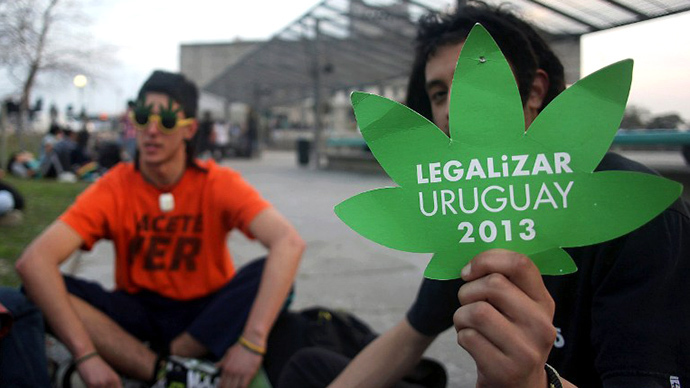Can Uruguay hash out a progressive model for cannabis reform?

If Uruguay’s cannabis policies succeed in curbing illegal drug trafficking and promoting responsible public use of the substance, other nations have no excuse not to experiment with alternative models of narcotics regulation.
The small Latin American nation of Uruguay has taken the brave step of becoming the first country in the world to fully legalize marijuana, one of the several progressive policies being undertaken by the left-of-center government of President José Mujica. The former Marxist and guerilla revolutionary spent more than a decade in jail prior to his release in 1985, and he later climbed his way up the political ladder from an elected deputy to president in 2009. Known for maintaining a frugal lifestyle and a preference for giving most of his monthly salary to charities that benefit the poor, Mujica has overseen the legalization of gay marriage, abortion, and now marijuana. Uruguay has become perhaps the region’s most socially liberal country, and the state’s decision to regulate the sale of marijuana – a de facto nationalization – will allow it to tinker with policies that can be emulated elsewhere if proven successful.
The new legislation would make marijuana commercially available to adult citizens after registering in a government database; users will be able to purchase 40 grams of marijuana from pharmacies every month and cultivate up to six plants on their property. The government aims to make marijuana available for one dollar per gram, with the aim of undercutting the black market rate of $1.40 per gram. Uruguay is estimated to have some 120,000 to 200,000 daily-to-occasional cannabis users, and the rationale behind the policy is that instead of these users getting their marijuana from traffickers and local mafia groups, the sensible alternative is to rein in the $40 million domestic industry by legitimizing it and offering a good quality product which can be regulated and offered in a safe environment.

Shaping laws to suit real-world conditions
There are obvious benefits to such a system; it allows the authorities to promote public health more effectively by ensuring a quality standard, and it allows for regulators to intervene if necessary if the substance is being misused. Julio Calzada, head of Uruguay’s National Drug Council, is the architect of the policy; he claims that most of the marijuana being sold in the country is trafficked from nearby Paraguay and contains chemicals, glue, and animal feces, in addition to other additives intended to increase the potency of the product. His plan is to strictly enforce the quality of the product and the amount of THC – the plant’s key psychoactive constituent – allowed to be cultivated in plants, which will be around 5 to 12 percent. The state also plans to offer advice to users on safer ways to consume the substance, such as through cooking it into snacks or using a vaporizer.
Authorities estimate that the new legislation will generate $8 million to $12 million in tax revenue, which will be channeled into awareness programs and toward the treatment of problematic users of harder substances. The benefits for the Uruguayan economy are undeniable as the government plans to give licenses to private businesses to cultivate the substance on state-controlled land; smalltime farmers will also be allowed to sell their product to the state, which will bring handfuls of ‘green sommeliers’ into the workforce. Uruguay’s new legislation could be considered taboo in many parts of the world, but the fact is that the policy is a response to real-world conditions and failed prohibition policies that have driven the industry into the underworld, giving rise to money laundering and arms trafficking, unchecked sales to minors, and a massive untaxed black market trade. Criminalization of marijuana by definition ensures that the supply chain remains in a lawless retail market controlled by drug traffickers and violent cartels.

The war on the ‘war on drugs’
The official view of the Uruguayan government is that the current criminalization of soft drugs is much more harmful to health than drug use itself. Consider that some 82 deaths have resulted from illicit drug trafficking in Uruguay in 2012, compared to zero killed by the consumption of marijuana. US anti-drug interdiction policies have channeled billions into repressive and thickheaded attempts to curb use that have resulted in incalculable human suffering, racially driven mass incarceration, and the empowerment of drug cartels. In the eyes of Latin Americans, US policy bears significant responsibility for the surging rates of crime and violence in Latin America. It is an incredible waste of resources for millions of people worldwide to be incarcerated for possessing minimal quantities of a soft drug; it is essentially a modern day witch-hunt, and meanwhile, the numbers of users across the globe are ever increasing.
Despite the abject failures of status-quo penalization policies, the UN’s drug body, supporting the International Narcotics Control Board (INCB), has taken a shamefully regressive position by lashing out at little Uruguay and accusing it of violating international law; the US State Department has taken the same line and called on the Uruguayan government “to comply with its international treaty commitments.” Uruguay insists it is acting within the spirit of the treaties by creating a solution to the drug problem with an aim to improve public health; the country’s drug czar replied to the INCB in an interview saying, “Uruguay is a sovereign country, with an elected parliament and a strong democratic tradition, so we’re going to continue with this policy in accordance with our sovereign and democratic rights.”
It would be truly reprehensible if the UN’s drug body moved to enforce sanctions on Uruguay under US pressure. Polls indicate that some 58 percent of American adults believe marijuana should be legalized, a number that seems to grow bigger every year. Around 20 US states have legalized medical cannabis, and California has narrowly rejected a reject proposal to tax consumption, which would have generated an estimated $1.3 billion in annual revenue that could be channeled into projects for social uplift. As demand for cannabis grows and medical marijuana use becomes more socially acceptable, now is the time to transform this clandestine cottage industry of growers and users into a legitimate business model to the benefit of society and the state. To put it bluntly, there is no reason why adults should be prevented from responsibly using cannabis for medical and recreational use, and to condemn users as common criminals by jailing them for using the substance is a policy that will look as ridiculous in the eyes of future generations as alcohol prohibition in the 1920s looks to us.
The statements, views and opinions expressed in this column are solely those of the author and do not necessarily represent those of RT.
The statements, views and opinions expressed in this column are solely those of the author and do not necessarily represent those of RT.













